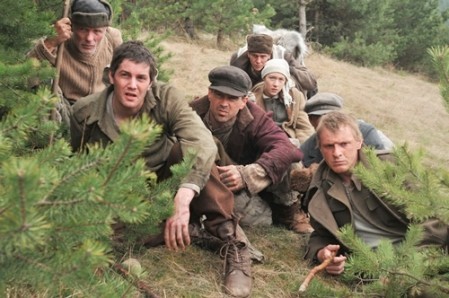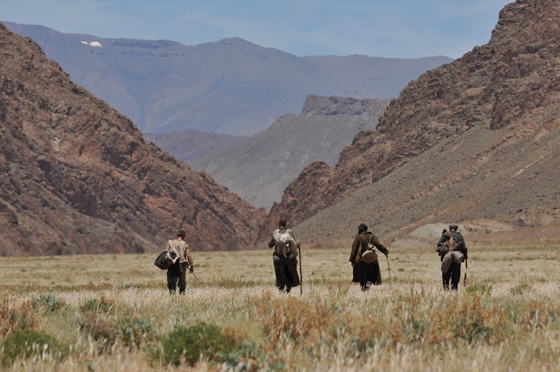Fri 21 Jan 2011
The Long and Winding Road
Posted by Ethan under Film Review, NYC Film Critic
Comments Off on The Long and Winding Road
The Way Back
Directed by Peter Weir
Screenplay by Keith R. Clarke and Peter Weir
Starring Jim Sturgess, Ed Harris, Colin Farrell Saoirse Ronan
***
If there’s one thing that unites director Peter Weir’s recent (and, with only four movies in the last eighteen years, sadly small) filmography it’s that each entry is, at its core, the story of a one man’s attempt to survive in the face of extreme circumstances.  Obviously that description can apply to any number of films, but Weir picks circumstances that are particularly extreme. 1993’s Fearless featured Jeff Bridges as the survivor of an airplane crash, 1998’s The Truman Show cast Jim Carrey as the unwitting star of a reality TV series with a cast and crew of hundreds and 2003’s Master and Commander: The Far Side of the World found Russell Crowe (in his last great screen performance) as a 19th century sea captain leading his frigate into battle against a bigger, faster opponent.
His latest film, The Way Back, stars Jim Sturgess (the British actor who is probably most familiar to American moviegoers as the lead in Across the Universe and 21) as a Polish prisoner-of-war captured by the Soviets in the run-up to World War II and sentenced to twenty years in the Siberian Gulag. Not long after arriving at the camp, Janusz conceives an escape plan that will take him south through the frozen wasteland of Siberia to freedom in Mongolia. Six of his fellow prisoners accompany him on this arduous trek, including enigmatic American Mr. Smith (Ed Harris), Russian criminal Valka (Colin Farrell), amateur artist Tomasz (Alexandru Potocean) and 17-year-old sacrificial lamb Kazik (Sebastian Urzendowsky). Along the way, they pick up teenage orphan Irena (Saoirse Ronan) and face a host of challenges, from harsh terrain to dwindling resources. The journey doesn’t stop when they reach Mongolia either—once they cross the border, they discover that formerly neutral territory is now under Soviet control. The only option is to press on, navigating through the unforgiving Gobi desert until they arrive in British-controlled India. It goes without saying that not all of them make it that far…
The Way Back is based on the 1956 memoir The Long Walk by Slavomir Rawicz (who authored the book with journalist Ronald Downing, although some say that Downing ghostwrote the entire manuscript) in which the author describes a similar journey from Siberia to India. The veracity of his account came into question after his death in 2004, when BBC reporters turned up evidence that Rawicz was actually released from the Gulag in 1942 as part of an amnesty deal for Polish soldiers and given a travel permit to return to his country’s army. (The story took another turn in 2009, when a different Polish World War II veteran came forward and claimed that his escape is the one chronicled in Rawicz’s book, although he had no hard evidence to offer.)
Since The Way Back isn’t a documentary, Weir understandably doesn’t concern himself with this larger debate surrounding the source material. Rather he uses the book as the basis for a decidedly old-fashioned outdoor adventure picture in the vein of such Hollywood classics as The Great Escape (the second half at least), Red River and The African Queen. Like those movies, The Way Back shows its actors trekking through real locations as much as possible; Weir shot big chunks of the film in the wilds of Bulgaria, Morocco and India and uses those backdrops to great effect throughout. But, due to budget and logistical constraints, the movie also noticeably uses studio soundstages to double for the great outdoors, particularly during some of the nighttime sequences. In a way though, the artificiality of those scenes works in the movie’s favor, making it seem even more firmly in the tradition of those ‘50s screen adventures, which have their stagey moments as well. Where Weir does depart from the past is in his harsh portrayal of the toll this journey takes on the characters. There’s little old Hollywood glamour here—Sturgess and the rest of the cast are shown bloodied, bruised, exhausted and near-death from malnutrition, dehydration and exposure. The actual deaths that do occur are presented quite unflinchingly as well; the audience really does feel the weight of that person’s passing.
Which makes it all the more unfortunate that these individuals aren’t more interesting when they’re walking and talking. Granted, the films The Way Back is modeled after don’t really function as probing character studies either, but they benefit greatly from the presence of bigger-than-life stars like Bogie, Hepburn, McQueen and Wayne playing archetypes that moviegoers instantly connect with. Here, screenwriters Weir and Keith R. Clarke leave us stranded with a largely bland bunch and the cast doesn’t do much to enliven their thinly-written roles. Apart from Farrell—who registers quite well as the possibly lethal Valka, goofy Russian accent aside—the performances are muted and undistinguished. Even Harris, an actor of considerable screen presence, seems to get swallowed up by the scenery. In Master and Commander (which remains one of the finest big-budget studio productions of the previous decade) Weir effectively balanced the sweeping spectacle of high-seas warfare with an equally compelling personal story depicting the friendship between a man of action and a man of science. The Way Back lacks the same kind of internal drama that would complement and enhance the characters’ external travails. It’s a visually arresting adventure, but it arrives at its final destination with little dramatic resonance.
The Way Back opens in theaters today.




No Responses to “ The Long and Winding Road ”
Sorry, comments for this entry are closed at this time.